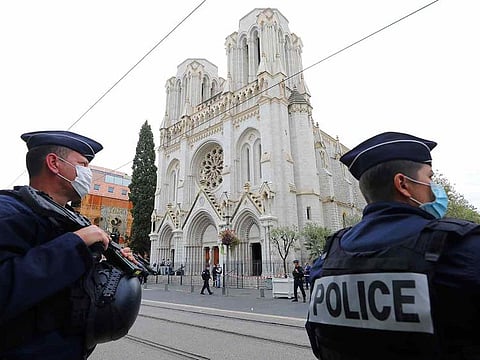French attacker still in hospital; man linked to Nice attacker detained
Attacker in life-threatening condition after being shot by police

Paris: French police were questioning Friday a man believed to have been in contact with the suspect who brutally killed three people at a church in Nice, an attack that left the country on high alert for further attacks ahead of a key Catholic holiday.
The 47-year-old was taken into custody late Thursday after the killings at Nice's Notre-Dame basilica by a 21-year-old Tunisian who arrived in France this month before carrying out what the government described as an act of "Islamist" terror.
The suspected knifeman, identified as Brahim Issaou, remained in serious condition after being shot multiple times by police in the aftermath of the Thursday morning attack.
"He wasn't on any of our security watchlists, either French or European," Interior Minister Gerald Darmanin said, reiterating that France was "at war with extremism... an enemy that is both internal and external."
"And when you're at war, you have to understand that unfortunately, there have been and there will be other incidents like this," he told RTL radio.
It was not immediately clear what relationship the man arrested late Thursday is suspected of having with the killer.
President Emmanuel Macron, who held a crisis meeting with top ministers Friday, has already stepped up military patrols at churches and other sites ahead of All Saints' Day on Sunday.
Many Catholic families mark the day with visits to cemeteries, which will remain open for visits despite a new coronavirus lockdown that took effect Friday.
Foreign Minister Jean-Yves Le Drian warned after the meeting that French citizens face a security risk "wherever they are" in the wake of the attack, saying alerts had been sent to all French nationals abroad.
Fears of voilence
The Nice attack came as fears of violence were already running high, just two weeks after a French teacher was beheaded in a street near his school in a Paris suburb.
The teacher, Samuel Paty, had infuriated some parents by showing cartoons mocking the Prophet Mohammed (PBUH) to students as part of a lesson on free speech, with some denouncing him in a social media campaign.
Two French newspapers, Le Figaro and Liberation, reported Friday that Darmanin had already told regional authorities last Sunday to be on heightened alert for "individual attack" attempts.
The warning came after a media service called Thabat, which the interior ministry note said was "linked to Al-Qaida," called for retaliation against France, not least over the publication of the cartoons by the satirical weekly Charlie Hebdo.
Fresh France protests
The attacker in Nice had a copy of the Quran, two phones and three knives when he entered the church in the centre of the Mediterranean city at around 8.30am, according to France's anti-terror prosecutor Jean-Francois Ricard.
He slit the throats of a 60-year-old woman and a 55-year-old man who worked at the church, and stabbed a 44-year-old Brazilian woman residing in France, who managed to flee but later died of her wounds.
The victims were "targeted for the sole reason that they were present in this church at that moment," Ricard said at a press conference late Thursday.
He said Issaoui was in a "life-threatening" condition.
Macron, who travelled to the scene, denounced a "terrorist attack" and said France would not cave to terror over his vow to combat extremist violence.
Authorities have closed some mosques and shut down two groups accused of fomenting hate and violence in the wake of Paty's killing, which prompted an outpouring of anger that saw thousands of people demonstrate across France last weekend.
More than 250 people have been killed in attacks on French soil since January 2015, when gunmen massacred 12 people at the offices of Charlie Hebdo over its publishing of the Prophet's (PBUH) cartoons.
To mark the start of the trial for 14 suspected accomplices of the attackers, Charlie Hebdo republished the controversial cartoons last month.
Just days later, an 18-year-old man from Pakistan seriously injured two people with a meat cleaver outside Charlie Hebdo's former offices in Paris.
But Macron's stance against extremist violence, and his defence of the cartoons, has outraged many Muslims around the world who accuse him of unfairly targeting an entire religion.
Protests erupted Friday in Afghanistan, Pakistan, Bangladesh and Lebanon, the latest in a string of mass rallies denouncing France.
But Le Drian, the foreign minister, insisted Thursday that France had only "a message of peace for the Muslim world," and several French imams have also appealed for calm.
"Today I feel like a Christian, because this touches the very heart of a man or woman," Otmane Aissaoui, imam at the ar-Rahma mosque in Nice, told AFP after the attack Thursday.
"Islam, like Christianity or Judaism, is light-years away from an act like this," he said.







